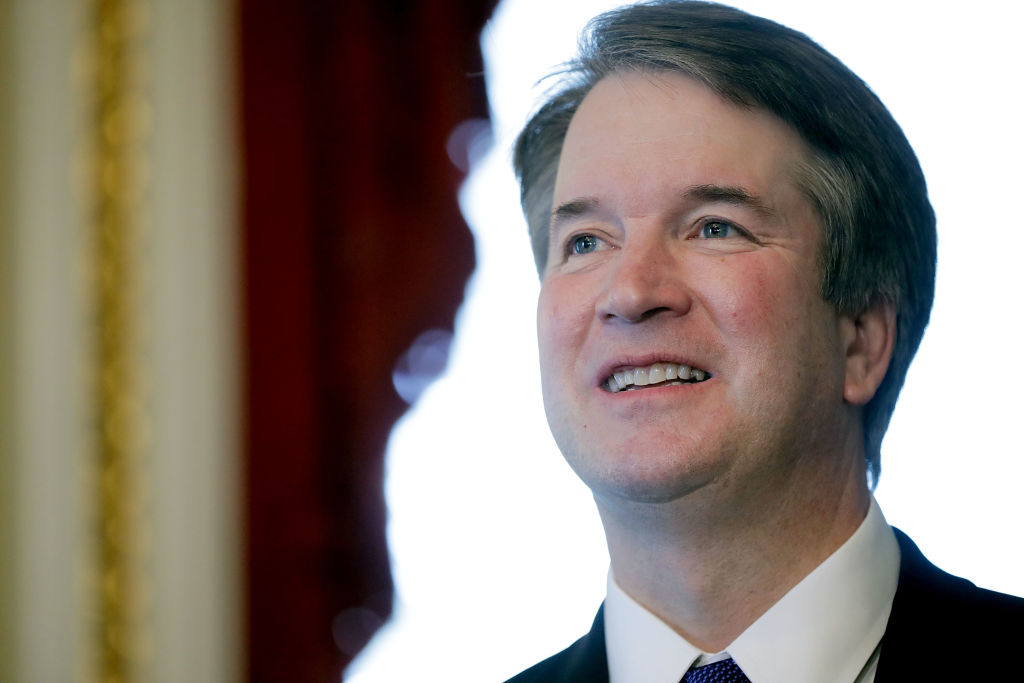‘Settled law,’ an unsettling phrase when it comes to the unborn, has haunted minds since Supreme Court nominee Judge Brett Kavanaugh appeared on the horizon last month.
The words thudded into the news cycle again this week when an elated Senator Susan Collins said Kavanaugh had assured her during their two-hour meeting that he considers the 1973 landmark abortion rights case Roe v. Wade to be settled law. This prompted rather some unseemly celebrations from the pro-abortion side, and sighs and despair among those who hoped America might change course on this emotive and important issue.
Until ‘settled law’ came out, Kavanaugh, who is slated to replace retiring Justice Anthony Kennedy, had managed to keep both sides of the abortion debate in a cold sweat over whether he would seize the opportunity to upend legal precedent establishing a woman’s right to abortion.
But is the question of Kavanaugh’s position settled? From an anti-abortion perspective, an optimistic read on his steely demeanor is that it is merely a tactic he was cornered into thanks to Republicans’ razor-thin majority in the Senate.
The two wildcard votes are pro-abortion Republicans Collins and Senator Lisa Murkowski, both of whom have kept their fellow lawmakers in the dark about which way they plan to vote in September on the conservative nominee. Together they could capsize Kavanaugh’s confirmation.
Because of the looming threat of Collins, who said she would oppose a nominee who ‘demonstrates hostility’ to Roe v. Wade, Kavanaugh may have an incentive to simply use dry language instead of offering details on what he would do should Roe be reconsidered.
Kavanaugh is a staunch originalist on the Constitution, leading some to reason that he would lean toward scrapping Roe, which has been criticised as ‘judicial activism,’ even by abortion rights supporters.
Roe was based on the notion that the right to abortion is bound up with a woman’s constitutional right to privacy as expressed by the 14th Amendment, which forbids states from ‘depriving any person of life, liberty, or property, without due process of law.’
Before he was on the Supreme Court, Chief Justice John Roberts said in 1990 that Roe ‘was wrongly decided and should be overruled.’ Later in his 2005 confirmation hearing, though, Roberts assured that ‘there’s nothing in my personal views that would prevent me from fully and faithfully applying that precedent.’
Kavanaugh also told Congress back in 2006 during his confirmation to the D.C. appellate court that he would follow Roe ‘faithfully and fully.’
However, while he was happy to declare Roe precedent, Kavanaugh was reportedly loath to tell Senator Chuck Schumer on Tuesday that the case was correctly decided. The judge refused to say that either Roe or Casey v. Planned Parenthood, a 1992 decision that upheld Roe and prevented states from inflicting an ‘undue burden’ on a woman seeking an abortion, were correct, the New York Democrat complained after their meeting this week.
His only major abortion decision may give a hint of how Kavanaugh, a faithful Catholic, might rule on the issue if seated on the highest court in the nation.
He dissented from the majority in Garza v. Hargan, a case about the abortion rights of a pregnant illegal immigrant teenager in government custody.
Kavanaugh hoped the girl could be transferred out of government custody into the hands of a sponsor, ‘someone the minor can talk to about this major life decision and get reassurance, talk to about options, get support.’ That would have carved the government out of the process of procuring the abortion for her.
‘That would allow her to be released from custody, which presumably would be a good thing, and allow her to obtain the abortion if she so chooses,’ the judge said.
Instead, the majority’s decision was ‘based on a constitutional principle as novel as it is wrong: a new right for unlawful immigrant minors in US Government detention to obtain immediate abortion on demand,’ he wrote.
Kavanaugh’s constitutional faithfulness shone through in another decision, which also happened to support his Catholicism.
In Priests for Life v. HHS, Kavanaugh voted against contraception mandate, which required religious organisations that oppose contraception to sign a form providing contraception for employees, saying it put a ‘substantial burden’ on religious liberty.
Curiously, as if in a nervous effort to safeguard abortion access, the Supreme Court stated in 1992 that ‘a decision to overrule should rest on some special reason over and above the belief that a prior case was wrongly decided,’ referring to Roe.
Such reasons include a change in facts or perceptions of facts, which medical advances have provided in abundance.
The foetal heartbeat is discernible only four weeks into pregnancy, and brain waves can be detected two weeks later. Polls show a majority of Americans want to keep Roe, but a majority of Americans also oppose late-term abortion. Only 6 in 10 support abortion in first trimester, and a tiny 13 per cent support abortions in the third trimester, according to a May Gallup poll.
Perhaps, for all the pro-abortion cheering this week, Kavanaugh can unsettle the law.


















